How to Make a Charcuterie Board
Published December 31, 2021. This post may contain affiliate links. Please read my disclosure policy.
You will absolutely love this easy-to-assemble charcuterie board that is jam-packed with cured meats, aged cheeses, fruit, pickled vegetables, spreads, and more. This is one show-stopping appetizer that will have everyone talking.
Whenever there is a get-together or party, there is nothing like a full assortment spread of delicious appetizers. If you are looking to impress your guests, then check out my oysters Rockefeller, or arancini balls.
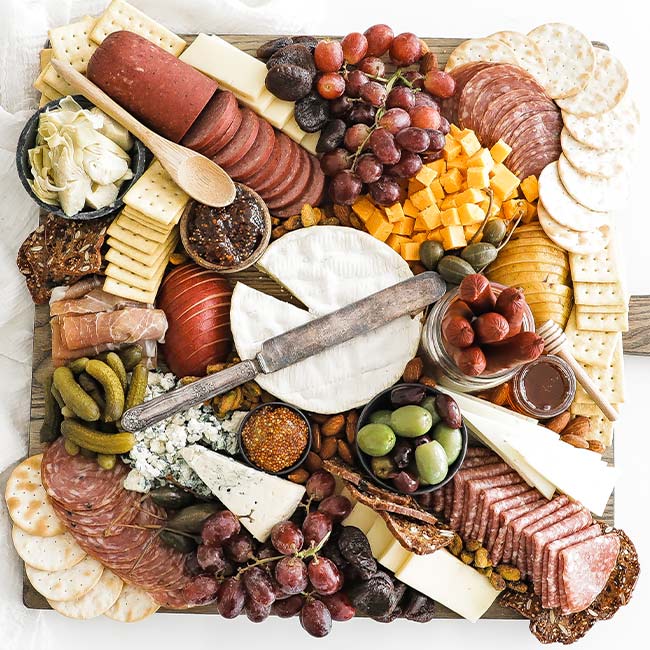
Charcuterie Board
Pronounced shahr-KOO-tuhr-ee, Charcuterie translates in standard terms from French to English as “deli.” The word was formally taken from the term cuiseur de chair, which means “cooker of meat.” The art of charcuterie has been a French staple since the 15th century. The word itself refers to but is not limited to, pork specialties such as patés, rillettes, galatines, fresh, cured, and dried meats.
In the past 15-20 years, a charcuterie board has turned into a combination plate filled with meats, cheeses, fruits, and other ingredients. I like to consider it the French version of the Italian antipasto platter. As charcuterie boards have gained popularity, you will also often see this dish as an option as an appetizer on menus across the US.
Charcuterie Board Video Tutorial
If you loved this charcuterie board video, then please subscribe to my YouTube channel for more great recipes. Be sure to smash the bell icon so you’ll know as soon as I post a new video.
What’s Usually on It?
While there are many variations of this dish depending on who is creating it and ingredient preferences, to me, there are 5 components that make up a good charcuterie board as an appetizer.
- Meat – Use a combination of fresh, cured, and dried meats such as prosciutto, ham, salami, summer sausage, etc.
- Cheese – I prefer a combination of soft, hard, and spreadable cheeses like blue cheese, cheddar, and brie.
- Fruit/Vegetables – I prefer seasonal fruit and dried fruits along with fresh and pickled vegetables.
- Spreads – This will help balance off some of the flavors in the other ingredients by using a spicy, tart, and sweet spread such as mustard, tart jam, and honey.
- Crackers – Having a combination of different shapes, textures, and styles of crackers is always a good idea.
- Nuts (Bonus) – I like to add spicy nuts, almonds, and other assorted nuts to help fill in the gaps. While this is functional, it also serves as an aesthetic to help fill in the charcuterie board.
Here are some ideas for each category:
Meats – ham, hard salami, sopressata, genoa, prosciutto, speck, summer sausage, pepperoni, mortadella, pate, beef sticks, pork sticks, coppa, chorizo, iberco, etc.
Cheese – cheddar, white cheddar, blue cheese, gorgonzola, fontina, brie, parmesan, asiago, manchago, gouda, Havarti, feta, goat, boursin, gruyere, comte, etc.
Fruit – pears, apples, grapes, oranges, strawberries, blackberries, blueberries, raspberries, persimmons, olives, dried plums, dried cherries, etc.
Vegetables – cornichons, capers, caper berries, pickles, cucumbers, carrots, bell peppers, roasted peppers, pepperoncini, artichokes, roasted garlic, etc.
Spreads – jams, jellies, spicy jelly, tart jams and jellies, honey, maple syrup, honeycomb, mustards, mayonnaise, aioli, etc.
Crackers – butter crackers, wafers, rice crackers, gluten-free crackers, herb crackers, artisan, dried fruit crackers, etc.
Nuts – almonds, pistachios, pecans, walnuts, spiced nuts, nut blends, peanuts, cashews, etc.
How to Make a Charcuterie Board
Use these easy step-by-step instructions for making a fantastic charcuterie board:
Select which board or platter you would like to use.
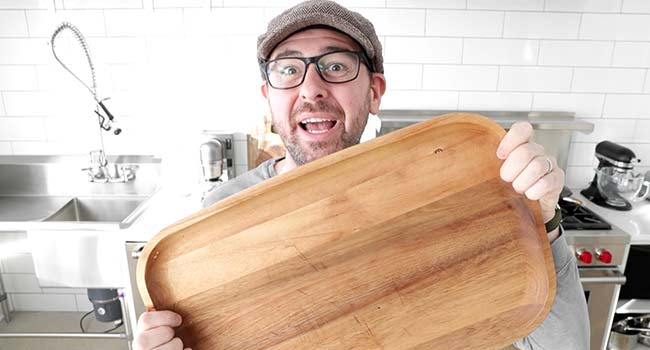
Start by adding the meats in a fanned-out fashion so that everything can see what proteins are available on the charcuterie board. It does not need to be so symmetrical.
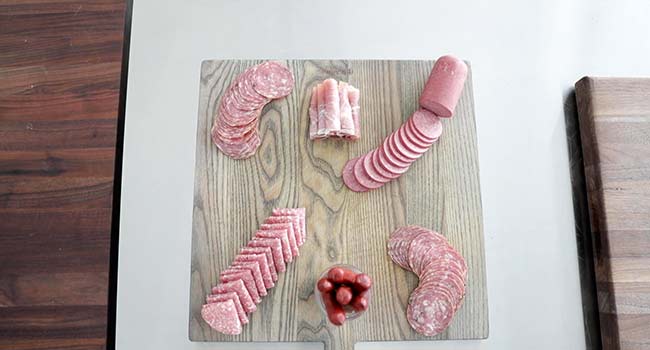
Next, do the same thing with the cheese but be sure to cut them down so that they are easy to access and easy to eat.
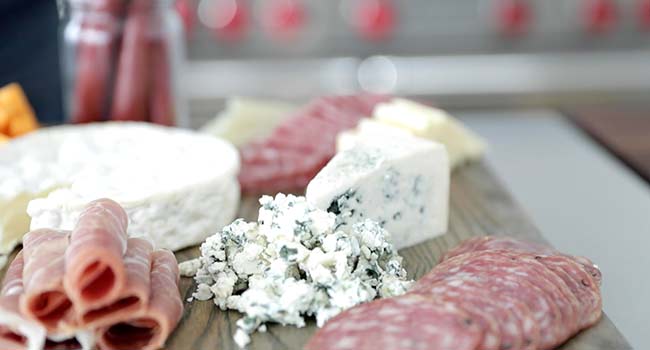
Follow up by filling in the gaps with assorted fruits, dried fruits, fresh vegetables, and pickled vegetables.
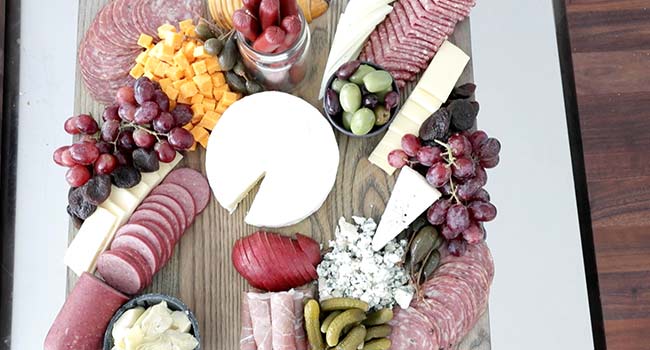
Place your spreads in little ramekins or jars and add them to the charcuterie board.
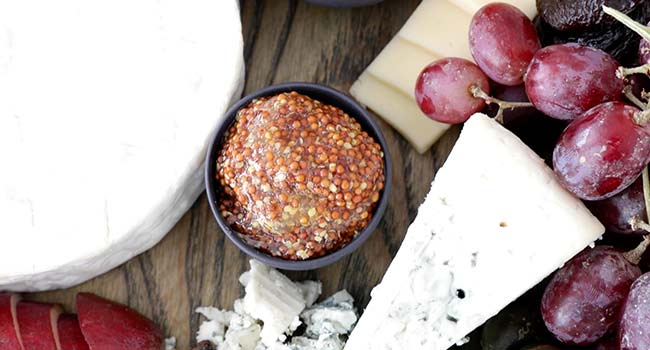
Add the crackers to the outside of the board where there is space. It is ok to place them underneath some of the other items on the board.
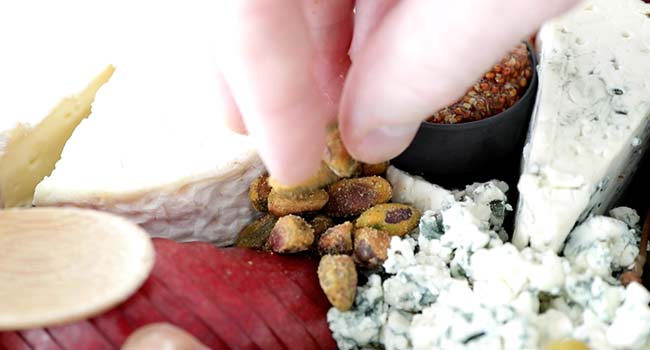
Finish by adding nuts to any visible gaps on the board to help make it look more full.
Make-Ahead and Storage
Make-Ahead: You can prepare this recipe up to 1 day ahead of time if you do not add the crackers. Cover it, crackerless, in plastic, and keep it in the refrigerator for up to 1 day. Pull out the plate about 1 hour before ready to serve it.
How to Store: Cover and keep in the refrigerator for up to 3 days. It is best if you keep the crackers separate in plastic zip bags at room temperature, or else, they can collect too much moisture in the refrigerator and will become too soft.

chef notes + tips
- You can absolutely swap out or use extra of every single ingredient I used in this charcuterie board. Make the recipe work for you.
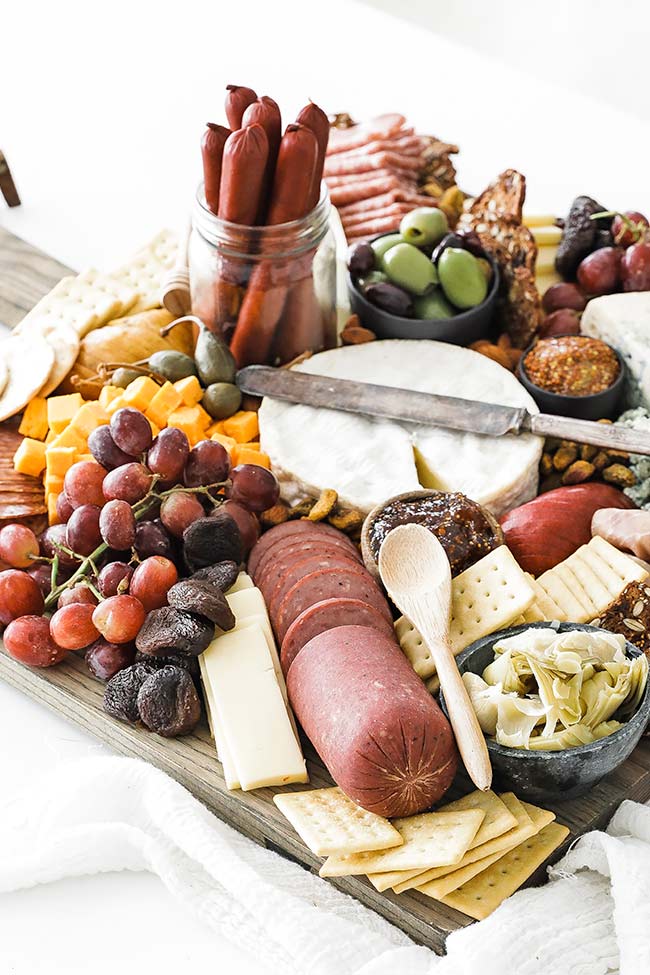
More Appetizer Recipes

Video
How to Make a Charcuterie Board
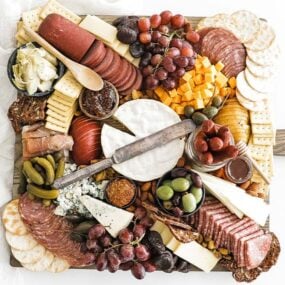
Ingredients
Meat:
- 2 ounces prosciutto ham, sliced
- 2 ounces soprasseta slices
- 2 ounces salami slices
- 8 ounces summer sausage, sliced
- 8 ounces beef sticks
Cheeses:
- 8 ounce brie cheese round
- 8 ounces fontina slices
- 8 ounces asiago slices
- 8 ounces aged cheddar, cut into ½” chunks
- 8 ounces blue cheese, crumble half of it
Fruits and Vegetables:
- 1 bunch of red grapes
- 2 sliced pears
- ½ dup dried plums
- 1 cup pitted assorted olives
- 1 cup cornichons
- 1 cup caper berries
- 1 cup quartered artichoke hearts
Spreads:
- ¼ cup honey
- ½ cup fig and orange jam
- ½ cup whole grain mustard
Crackers:
- butter crackers
- wafers
- artisan herb crackers
Nuts:
- ½ cup almonds
- ½ cup spicy pistachios
Instructions
- Select a very large cutting board or platter to serve everything on.
- Start by adding the meat slices in a fanned-out fashion so that everything can see what proteins are available on the charcuterie board. It does not need to be symmetrical but be sure not to place them right next to each other.
- Next, do the same thing with the cheese but be sure to cut them down so that they are easy to access and easy to eat.
- Follow up by filling in the gaps with assorted fruits, dried fruits, fresh vegetables, and pickled vegetables.
- Place your spreads in little ramekins or jars and add them to the charcuterie board.
- Add the crackers to the outside of the board where there is space. It is ok to place them underneath some of the other items on the board.
- Finish by adding nuts to any visible gaps on the board to help make it look fuller.




Amazing & stunning yet made so simple to creat
Excellent!
This showed up at the exact right moment! Having guests for the holidays and this will be wonderful!
Appreciate you trying this!
I made one! Thanks for the guidelines! I used serrano ham, some roast beef, dry salami, swiss cheese, aged cheddar, gouda, then restocked with manchego. Crackers with cranberry and pumpkin seed, ramekins had chicken salad and another had olives. Filled gaps with blackberries and toasted walnuts. A big hit!
awesome
Your recipe is good but your video was particularly helpful for this recipe.